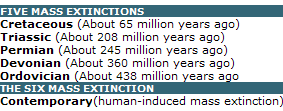Read the Introduction Here
Introduction
There have been five mass extinctions in the history of earth, and the sixth is expected to be caused by humans. Over the summer I read the

book The Sixth Extinction: An Unnatural History by Elizabeth Kolbert. Kolbert recounts her experience traveling the world and looking at the effects of global climate change. She saw everything from sanctuaries for endangered animals to dying coral reefs. The main discussion throughout the book is the Anthropocene. As written in my Introduction, "The term Anthropocene is described in this book as an epoch--a period of time in history marked by notable events--that began when human activity started to affect our ecosystems. Scientists suggest that "Anthropocene" be used to describe the current epoch in history." We, as humans, have done enough damage and left such an impact that this time will be nammed after our mistakes.

Excerpt from the Introduction:
"Past extinctions are largely a mystery but there are many educated guesses as to what their reasonings were. Volcanic eruptions and the impacts of large asteroids or comets are suspects in many of these cases; both of which would release tons of debris into the atmosphere. This debris would darken the skies and block out sunlight causing plants and plant-eating creatures to quickly die. These dying plants unleash toxic and heat-trapping gases, such as carbon, which cause global warming. With this as an example, we know that the release of greenhouse gasses must be stopped. Humans must realize when they have reached a point of no return. Already we alone have been the cause of extinction for so many species. Overhunting and deforestation have become commonplace even though the natural world suffers from it. We must realize that we are doing so much harm to ourselves and other species that all share this earth."
Spix's Macaw, a species presumed to be extinct in the wild



